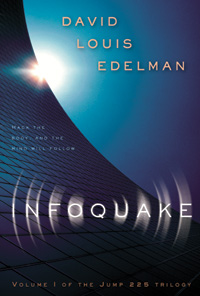Norman Spinrad recently wrote a review in Asimov’s of my novel Infoquake wherein he discussed the scientific accuracy of the book. Mr. Spinrad had this to say:
[W]hether or not such a novel could be considered “hard science fiction”… might be moot if Edelman himself were just blowing rubber science smoke and mirrors. Instead, he is actually trying to make bio/logics and MultiReal seem scientifically credible in the manner of a hard science fiction writer and doing a pretty good job of it, at least when it comes to bio/logics.
Edelman seems to have convincing and convincingly detailed knowledge of the physiology and biochemistry of the human nervous system down to the molecular level. And cares about making his fictional combination of molecular biology and nanotech credible to the point where the hard science credibility of the former makes the questionable nature of the latter seem more credible even to a nanotech skeptic like me.
A week or so later, SF Diplomat took a potshot at the scientific credibility of the book in his smackdown of Spinrad’s piece, saying that though the book is enjoyable enough, “Infoquake is practically fantasy.”
This has led me to give some thought about the scientific credibility of Infoquake and the scientific credibility of science fiction in general. Should the reader care whether my book — or any SF book — has good science?
For the record, my knowledge of science is fairly rotten. I don’t have the foggiest idea what the spleen does, I can’t really tell you anything about Planck’s constant, and I had to put down A Brief History of Time about 40 pages in because I was overwhelmed. As you might imagine, I’m very pleased that Spinrad thought I have “convincingly detailed knowledge of the physiology and biochemistry of the human nervous system down to the molecular level.” Greg Egan and Arthur C. Clarke are probably climbing into graves right now specifically for the purpose of rolling over in them.
But when I started the process of writing Infoquake, my intention was to write a novel about high-tech sales and marketing. It was only supposed to be accurate insomuch as it wasn’t supposed to make people with real scientific knowledge snicker. So I set the book at some undefined time in the future, about a thousand years from now, and I stuck an apocalyptic AI revolt in the interregnum to really wipe the slate clean. Then I made three suppositions:
- Give the scientists (virtually) unlimited computing power.
- Give the scientists (practically) inexhaustible energy reserves.
- Give the scientists a few hundred years to tinker, without all the regulatory, governmental, religious, and socioeconomic chokeholds in place today.
Supposing all that… What kind of world would we end up with?
I started doing my initial research through your typical high-level Encarta searches and the like (Wikipedia wasn’t around then). And I discovered that we’re really, really close on so many “science fictional” technologies already. Teleportation? We’ve got teleportation, believe it or not. (Okay, so it’s only on a quantum level at this point, but why quibble?) Orbital colonies, medical nanobots, virtual reality, and neural manipulation? All possible, based on the evidence we have now.
 Gormenghast is a suitable companion-piece to Titus Groan. The two are so alike in tone and theme, that they seem to have been written in a single burst of inspiration. Peake provides us with an extended cast of characters, this time including Headmaster Bellgrove and his professors; he follows the rise of Steerpike’s crooked ambitions to their ruinous end; and he gives us a climactic manhunt that’s every bit as insanely drawn out as the battle between Flay and Swelter from the first novel.
Gormenghast is a suitable companion-piece to Titus Groan. The two are so alike in tone and theme, that they seem to have been written in a single burst of inspiration. Peake provides us with an extended cast of characters, this time including Headmaster Bellgrove and his professors; he follows the rise of Steerpike’s crooked ambitions to their ruinous end; and he gives us a climactic manhunt that’s every bit as insanely drawn out as the battle between Flay and Swelter from the first novel. I think I’ve discovered now why authors do that.
I think I’ve discovered now why authors do that.